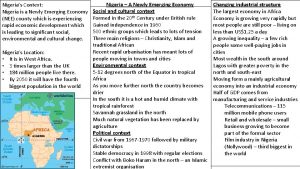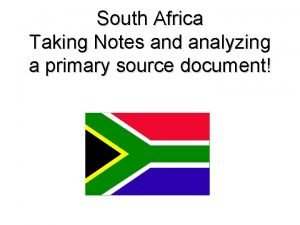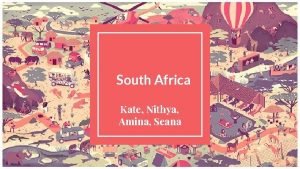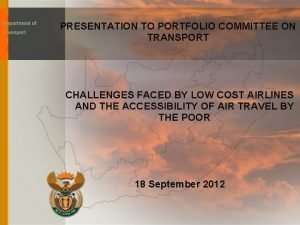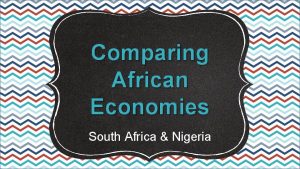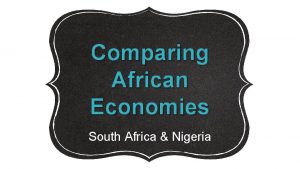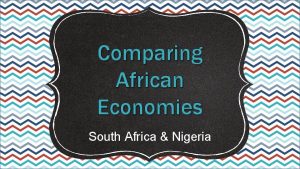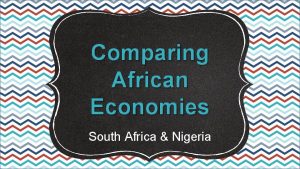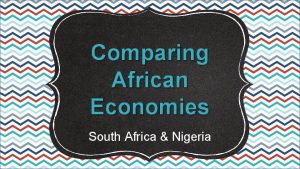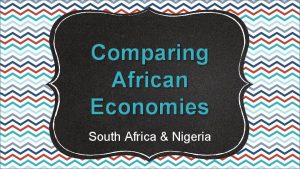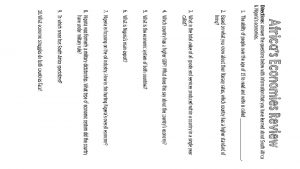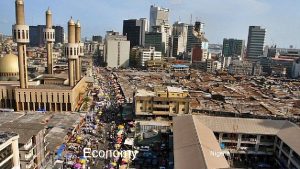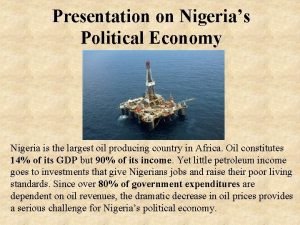Comparing African Economies South Africa Nigeria Nigerias Economy














- Slides: 14

Comparing African Economies South Africa & Nigeria

Nigeria’s Economy

Economic System • Like all countries with democracies, Nigeria has a mixed economic system. • However, because of a long period of military dictatorship, Nigeria’s poorly organized economy is struggling to move away from a command system. • Nigeria would like to become a strong leader in the world’s oil market, but poor organization and corruption are obstacles that the country must correct and overcome.

GDP • Nigeria’s GDP is $455. 5 billion (US dollars). • It is ranked 31 st in the world. • The GDP per capita (value of goods and services produced person) is $2, 800.

Natural Resources • What are Nigeria’s major natural resources? • natural gas, petroleum, tin, iron ore, coal, limestone, niobium, lead, zinc, & arable land • Nigeria has rich oil deposits. • The country's petroleum sector is the focus of Nigeria’s economy. • The United States gets almost 17% of its imported oil from Nigeria.

Nigerian Oil Spill, 2011

Land Use • What percentage of the land is arable (capable of being farmed)? • 38. 97% • What are the major agricultural products? • cocoa, peanuts, cotton, palm oil, corn, rice, sorghum, millet, cassava (tapioca), yams, rubber, cattle, sheep, goats, pigs, timber, fish

Currency e

Industries • What’s produced in Nigeria’s factories? • crude oil, coal, tin, columbite, rubber products, wood, hides and skins, textiles, cement and other construction materials, food products, footwear, chemicals, fertilizer, printing, ceramics, steel • Agriculture accounts for 70% of Nigeria’s economy.

Specialization • Nigeria’s chief exports include: • petroleum and petroleum products (95%), cocoa, & rubber • Nigeria specializes in exporting oil. • Unfortunately, the emphasis on oil production has left other parts of Nigeria’s economy disorganized. • Nigeria has to import food to feed its growing population.

Literacy Rate • What percentage of the population over the age of 15 can read and write? • Males – 72. 1% • Females – 50. 4% • How long are students expected to stay in school? • Males – 10 years old • Females – 8 years old

Nigerian School

Unemployment Rate • What percentage of people do not have jobs? • 23. 9% of Nigeria’s workforce is unemployed. • What percentage of people live in poverty? • 70% of Nigeria’s population cannot meet basic needs.

Currency Exchange • Currency exchange is the price of one country’s currency compared to another. • 1 US dollar = 10. 23 South African rand • 1 US dollar = 158. 4 Nigerian naira • 1 South African rand = 15. 5 Nigerian naira • What does this mean? • South Africa’s economy is stronger than Nigeria’s, but the US’s economy is much stronger than both.
 Is nigeria a newly emerging economy
Is nigeria a newly emerging economy Comparing african governments
Comparing african governments Your local foundry is adding a new furnace
Your local foundry is adding a new furnace Athens and sparta were both
Athens and sparta were both Naairs south africa
Naairs south africa Sacap contact details
Sacap contact details South african air quality information system
South african air quality information system South african principals association
South african principals association The south african apartheid
The south african apartheid South african freedom charter pdf
South african freedom charter pdf Louay safi
Louay safi South african transport conference
South african transport conference Hartswater bosluis
Hartswater bosluis South african plateau map
South african plateau map South african tax
South african tax
